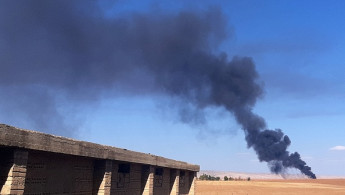At least nine killed in Turkish strikes on northeast Syria, SDF says
Turkish strikes on Thursday on military and infrastructure targets in Kurdish-held northeastern Syria killed at least nine people, Kurdish security forces said, after Ankara had threatened raids in retaliation for a bomb attack.
While Turkey regularly carries out drone attacks in Syrian Kurds' semi-autonomous region, Ankara on Wednesday warned of more intense cross-border air raids, after concluding that militants who staged a weekend attack in the Turkish capital came from Syria.
Thursday's strikes on Hasakeh province "killed six members of the internal security" forces, a statement from the Kurdish force's media centre said.
Earlier, Farhad Shami, spokesman for the Kurdish-led, US-backed Syrian Democratic Forces (SDF), the Kurds' de facto army, had said the strike killed six workers at a brick factory.
He said another worker at a separate site in the province was also killed.
The statement from the Kurdish internal security forces also said "two civilians" were killed in a strike on a motorcycle.
The Syrian Observatory for Human Rights, a Britain-based group with a network of sources on the ground, had reported earlier that a strike in the Hasakeh area hit a car, killing two people.
The US-backed SDF led the battle that dislodged Islamic State group fighters from their last scraps of Syrian territory in 2019.
Turkey views the Kurdish People's Protection Units (YPG) that dominate the SDF as an offshoot of the Kurdistan Workers' Party (PKK), which is listed as a terror group by Turkey and its Western allies.
Since Sunday, Turkey has launched strikes on PKK positions in northern Iraq, after two security officers were wounded in the Ankara attack, which was claimed by the PKK.
"There has been a clear escalation since the Turkish threats," Shami said, reporting intensive overflights of Kurdish-held areas of northeast Syria.
He said the strikes had targeted military and civilian sites including oil infrastructure.
AFP correspondents saw black smoke rising from oil sites near Qahtaniyeh, close to the Turkish border.
Turkish Foreign Minister Hakan Fidan had alleged the perpetrators of Sunday' attack outside the interior ministry in Ankara had been trained in Syria and warned of reprisals against Kurdish fighters in northeastern Syria.
"It has become clear that the two terrorists came from Syria and were trained there," Fidan said in televised comments.
"From now on, all infrastructure, large facilities and energy facilities belonging to (armed Kurdish groups) in Iraq and Syria are legitimate targets for our security forces," he added.
"I recommend that third parties stay away from these facilities."
In the market of the city of Qamishli in Hasakeh province, vendors were anxiously following the escalation on their mobile phones and televisions.
Hassan al-Ahmad, a 35-year-old fabric merchant, said there were fewer people out than usual.
"The situation is worsening every day. Turkey doesn't let us breathe," he said.
"We just want our children to live in peace," he added.
locals in NE Syria are living great panic due to the turkish bombing targeting infrastructure across NE Syria.
— Mustafa Al-Ali (@Mustafa_Alali2) October 5, 2023
2 sites was targeted in Hasakeh close to Washo kani camp.
1 site was targeted in Çil Agha near a main dam.
1 site was targeted in Amuda city in Tel Hanash village. pic.twitter.com/TsGz94aJu0
The Kurdish administration called on "the international community, the international coalition" and Russia to "take a stand capable of dissuading" Turkey from its attacks.
The United States, Russia and Turkey all have troops in areas of the war-torn country.
SDF commander Mazloum Abdi denied on Wednesday that the Ankara assailants had "passed through our region".
"Turkey is looking for pretexts to legitimise its ongoing attacks on our region and to launch a new military aggression," he said.
"The threat to target the region's infrastructure, economic resources and populated cities is a war crime," he added.
Between 2016 and 2019, Turkey carried out three major operations in northern Syria against Kurdish forces.
Kurdish forces led the anti-IS offensive and are still supported by the United States.
State Department spokesperson Vedant Patel said the United States "remains concerned about the military escalation in northern Syria".
"In particular, we're concerned about the impact on civilian populations and the effectiveness that it could place on the efforts that have been ongoing to defeat" IS, he added.




 Follow the Middle East's top stories in English at The New Arab on Google News
Follow the Middle East's top stories in English at The New Arab on Google News


